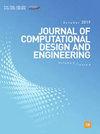An Exploration of Public Open Spaces with Data Driven Approaches: A Case Study of Beyazıt Square
IF 6.1
2区 工程技术
Q1 COMPUTER SCIENCE, INTERDISCIPLINARY APPLICATIONS
引用次数: 0
Abstract
Data-driven approaches are widely used to gain insight in urban dynamics and support urban decisions with pervasive adoption of information technologies. In the presented study, the students adopt data data-driven approaches to observe, and analyze public spaces, and make conceptual decisions for urban furniture in the context of the workshop. This workshop is developed within the scope of the Environmental Computing course. It is conducted with 27 students in Beyazıt Square as a case study area. In the scope of the study, open public spaces were observed and analyzed using data-driven approaches. Based on the analysis results, the students were expected to develop urban furniture design that would enhance user experience and activities in the area. This study questions how data-driven approaches aid in exploring public spaces and support design decisions. The objective of the study was to explore user-generated urban dynamics using multiple data and make decisions for urban furniture that augments urban dynamics. The conceptual design process of urban furniture is shaped as results of data-driven approach. The students were introduced to the Public Life Tools developed by the Gehl Institute for site observation. They were divided into particular groups and used relevant digital tracking applications to measure user activities, user profiles, and live traffic in the area. They evaluated the quality of place based on predetermined criteria by Gehl Institute. The phases of the study involve (1) the exploration of digital observation methods, (2) mapping observational, data, urban data, and locative media data in Geographic Information System (GIS), and (3) defining the relationships between the parameters affecting urban dynamics. (4) This was followed by making conceptual design decisions and (5) developing the design of urban furniture considering data analysis results. According to the findings, the use of data-driven observation and analysis methods has been effective in developing user scenarios, determining user profiles, identifying needs, and taking functional decisions in urban furniture design. Based on the students’ evaluation, the data-driven decision-making process was effective in identifying needs, problems, and potentials in the area. As the limitations of the study, the students stated that the use of digital observation methods and the learning process of GIS software were challenging. This study contributes to the field of urban computing through its conducted fieldwork.数据驱动的公共开放空间探索——以Beyazıt广场为例
数据驱动的方法被广泛用于洞察城市动态,并通过广泛采用信息技术来支持城市决策。在本研究中,学生们采用数据驱动的方法来观察和分析公共空间,并在工作坊的背景下为城市家具做出概念性决策。这个工作坊是在环境计算课程的范围内开发的。27名学生在Beyazıt广场作为案例研究区域进行研究。在研究范围内,使用数据驱动的方法观察和分析开放的公共空间。根据分析结果,学生们被期望开发城市家具设计,以增强该地区的用户体验和活动。这项研究质疑数据驱动的方法如何帮助探索公共空间和支持设计决策。该研究的目的是利用多种数据探索用户生成的城市动态,并为增强城市动态的城市家具做出决策。城市家具的概念设计过程是数据驱动方法的结果。学生们被介绍到由Gehl研究所开发的用于现场观察的公共生活工具。他们被分成特定的小组,并使用相关的数字跟踪应用程序来测量该地区的用户活动、用户档案和实时流量。他们根据格尔研究所预先确定的标准来评估地方的质量。研究的阶段包括:(1)探索数字观测方法;(2)在地理信息系统(GIS)中绘制观测数据、数据、城市数据和位置媒体数据;(3)定义影响城市动态的参数之间的关系。(4)然后进行概念设计决策,(5)根据数据分析结果进行城市家具设计。根据研究结果,在城市家具设计中,使用数据驱动的观察和分析方法在开发用户场景、确定用户概况、识别需求和做出功能决策方面是有效的。基于学生的评价,数据驱动的决策过程在识别该领域的需求、问题和潜力方面是有效的。由于研究的局限性,学生们表示数字观测方法的使用和GIS软件的学习过程具有挑战性。本研究通过其实地工作对城市计算领域做出了贡献。
本文章由计算机程序翻译,如有差异,请以英文原文为准。
求助全文
约1分钟内获得全文
求助全文
来源期刊

Journal of Computational Design and Engineering
Computer Science-Human-Computer Interaction
CiteScore
7.70
自引率
20.40%
发文量
125
期刊介绍:
Journal of Computational Design and Engineering is an international journal that aims to provide academia and industry with a venue for rapid publication of research papers reporting innovative computational methods and applications to achieve a major breakthrough, practical improvements, and bold new research directions within a wide range of design and engineering:
• Theory and its progress in computational advancement for design and engineering
• Development of computational framework to support large scale design and engineering
• Interaction issues among human, designed artifacts, and systems
• Knowledge-intensive technologies for intelligent and sustainable systems
• Emerging technology and convergence of technology fields presented with convincing design examples
• Educational issues for academia, practitioners, and future generation
• Proposal on new research directions as well as survey and retrospectives on mature field.
 求助内容:
求助内容: 应助结果提醒方式:
应助结果提醒方式:


